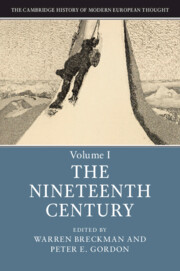Book contents
- The Cambridge History of Modern European Thought
- The Cambridge History of Modern European Thought
- The Cambridge History of Modern European Thought
- Copyright page
- Contents
- Contributors
- Preface
- Introduction
- 1 German Idealism: The Thought of Modernity
- 2 European Romanticism: Ambivalent Responses to the Sense of a New Epoch
- 3 History, Tradition, and Skepticism: The Patterns of Nineteenth-Century Theology
- 4 The Young Hegelians: Philosophy as Critical Praxis
- 5 Utilitarianism, God, and Moral Obligation from Locke to Sidgwick
- 6 Capital, Class, and Empire: Nineteenth-Century Political Economy and Its Imaginary
- 7 Positivism in European Intellectual, Political, and Religious Life
- 8 European Liberalism in the Nineteenth Century
- 9 European Socialism from the 1790s to the 1890s
- 10 Conservatism: The Utility of History and the Case against Rationalist Radicalism
- 11 The Woman Question: Liberal and Socialist Critiques of the Status of Women
- 12 Darwinism and Social Darwinism
- 13 Historicism from Ranke to Nietzsche
- 14 Philology, Language, and the Constitution of Meaning and Human Communities
- 15 Decadence and the “Second Modernity”
- 16 Nihilism, Pessimism, and the Conditions of Modernity
- 17 Civilization, Culture, and Race: Anthropology in the Nineteenth Century
- 18 The Varieties of Nationalist Thought
- 19 Ideas of Empire: Civilization, Race, and Global Hierarchy
- 20 Rethinking Revolution: Radicalism at the End of the Long Nineteenth Century
- Index
7 - Positivism in European Intellectual, Political, and Religious Life
Published online by Cambridge University Press: 15 August 2019
- The Cambridge History of Modern European Thought
- The Cambridge History of Modern European Thought
- The Cambridge History of Modern European Thought
- Copyright page
- Contents
- Contributors
- Preface
- Introduction
- 1 German Idealism: The Thought of Modernity
- 2 European Romanticism: Ambivalent Responses to the Sense of a New Epoch
- 3 History, Tradition, and Skepticism: The Patterns of Nineteenth-Century Theology
- 4 The Young Hegelians: Philosophy as Critical Praxis
- 5 Utilitarianism, God, and Moral Obligation from Locke to Sidgwick
- 6 Capital, Class, and Empire: Nineteenth-Century Political Economy and Its Imaginary
- 7 Positivism in European Intellectual, Political, and Religious Life
- 8 European Liberalism in the Nineteenth Century
- 9 European Socialism from the 1790s to the 1890s
- 10 Conservatism: The Utility of History and the Case against Rationalist Radicalism
- 11 The Woman Question: Liberal and Socialist Critiques of the Status of Women
- 12 Darwinism and Social Darwinism
- 13 Historicism from Ranke to Nietzsche
- 14 Philology, Language, and the Constitution of Meaning and Human Communities
- 15 Decadence and the “Second Modernity”
- 16 Nihilism, Pessimism, and the Conditions of Modernity
- 17 Civilization, Culture, and Race: Anthropology in the Nineteenth Century
- 18 The Varieties of Nationalist Thought
- 19 Ideas of Empire: Civilization, Race, and Global Hierarchy
- 20 Rethinking Revolution: Radicalism at the End of the Long Nineteenth Century
- Index
Summary
Positivism inherited the anti-metaphysical stance of the French Enlightenment and with its empirical bias sought to put a stop to traditional philosophical movements. Understanding the history of positivism is difficult for several reasons. It was enormously influential in its day, exercising a strong attraction over a wide range of thinkers. At the same time, it was the object of harsh and even dismissive criticism. Many of its difficulties stem from the character of its founder, Auguste Comte (1798–1857), a brilliant polymath but also a highly unstable person who spent time in a mental asylum and conceived his project in highly different ways at various moments in his life. To him, positivism was a philosophy of science, a framework for understanding history, a source of morality, and a solution to the social and political problems of his day. But many people, even some attracted to parts of the system, rejected positivism as authoritarian, excessively materialist, deaf to human spiritual needs, or misguided in attempting to restore a kind of religious authority in a world no longer able to be subject to it. That it belonged somehow both to the realm of science and to that of religion was one reason why it appealed to some people and repelled others. Comte’s successors, many of whom occupied important places in their time, added to the confusion by focusing exclusively on one or another of the aspects he had sought to bring together. Eventually, many people who never heard of Comte or read him developed ideas connected with him.
- Type
- Chapter
- Information
- The Cambridge History of Modern European Thought , pp. 151 - 171Publisher: Cambridge University PressPrint publication year: 2019
- 3
- Cited by

